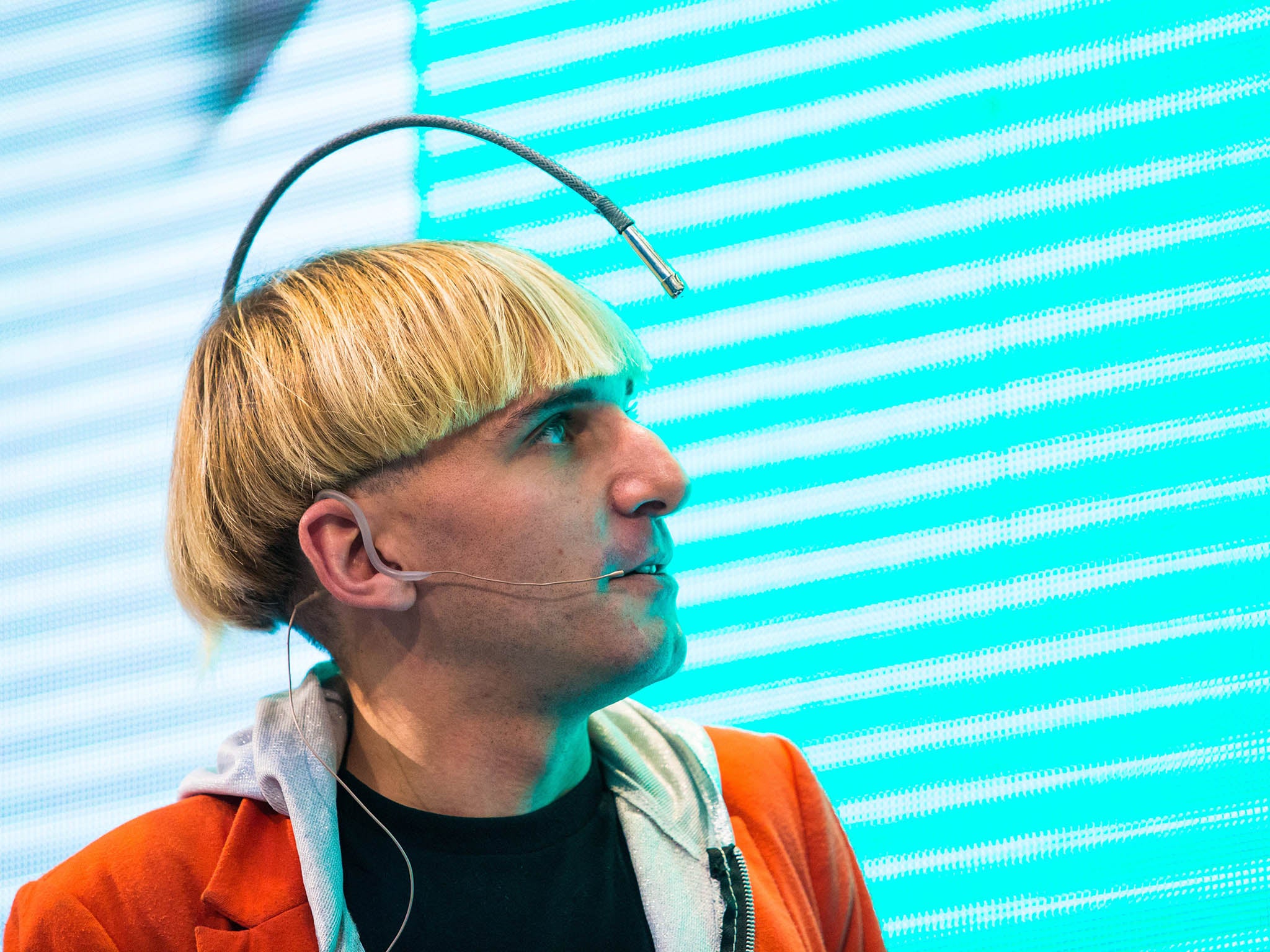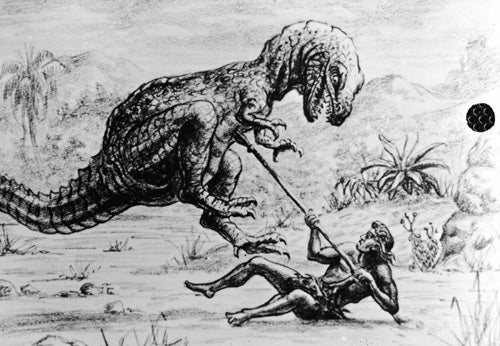The present no longer exists: How we adorn ourselves with technology but our brains cannot break out of caveman combat mode
Adorn ourselves with technologies as we may, our brains can't get out of caveman combat mode. Not convinced? Just look at Brexit and Games of Thrones

I was recently listening to a six-year old girl – using Skype on a tablet – explaining how flying cars work to her grandmother, while at the same time reading about an 11-year old girl who had just become the third wife of a 41-year old rubber merchant, when I was finally forced to the conclusion that the present no longer exists.
There is nothing but the distant future and the remote past existing simultaneously – locked into some kind of embrace in our brains. Inevitably, since the outer world replicates the inner, there is also a conflict being acted out between them all around the world. And at the moment, so far as I can see, the caveman is winning out over homo deus.
I am currently in New York. When I got here the clocks, on EST, were five hours behind London time. But my biological clock was set to GMT. Hence jet lag, the queasy sensation of shifting from one time zone to another, getting ahead of or falling behind the chronology of the sun. I got over it in a day. I adapted.
But there is a larger sense in which we have never fully adapted to a much longer shift in time. The hunter-gatherer co-exists within the city-dweller. I can go about Manhattan, technologically enhanced, relying on satnav and a weather app to guide me, while at the same time, in one part of my brain, convinced that I am hunting a woolly mammoth, and potentially prey to saber tooths.
I am both urban vegetarian and bloodthirsty not-so-noble savage. This is the 100,000-year jetlag, which we still haven’t got over. We are the messed-up, conflicted product of asynchronous development (which I date, very approximately, from the hypothetical origin of language).
We are out of sync with ourselves. We really do suffer from déjà vu, the sense of having been here before, but long long ago, the primal memory of palaeolithic behaviour engraved deep in our neural pathways. It’s probably the fundamental insight of evolutionary and anthropological thinking of the past couple of centuries, from Cuvier and Lamarck on.

Like archaeopteryx, every bird is part dinosaur. In the same way, we are a curious mix of Fred Flintstone and Space Oddity, aiming at the stars and still roaming about the Kalahari. Current conflicts bear this out. In the UK, it’s all about leaving versus remaining. In the US, it’s red states versus blue states. But these arguments could not even exist if that cognitive dissonance was not already in place in the vast collective unconscious.
We (in our split psyche) want it all. Red and blue, leave and remain – which is why Theresa May’s dog’s dinner approach might actually stand a chance, since it reflects a fundamental reality. Half-in, half-out is exactly where we are in terms of our development as a species. An intermediate, morally ambiguous state.
The great 19th-century French sociologist, Auguste Comte, taking the long view, formed the opinion that humanity had traversed two earlier phases, the theological and the metaphysical, and we had finally broken through into the more scientifically informed sunlit uplands of “positivism”. Maybe he really believed this, but it’s roughly on a par with saying “good dog” to a particularly troublesome beast. It’s borderline wishful thinking. We have somehow managed to telescope Comte’s three stages into one highly confused state. The inescapable truth of our day is that the mythic never went away. Our thinking is mytho-positivist.
The global village makes us conscious of how connected we are. Not only with one another but with other species too. Unless you’re Robinson Crusoe, interdependence is the central fact of our everyday lives. No man is an island. We are, as the quantum physicists say, entangled. And yet we are seemingly ruled by manic isolationism and naked tribalism. I offer just a few examples of our 21st-century schizoid mind.

Scapegoats
We began with sacrificing animals to the gods. Then we moved on to humans. We created a whole religion out of a single act of crucifixion. A religion in which even God seems to think that by sacrificing someone (his son?) he can placate the gods. It may be the most magical feature of fascism. If we get rid of them, all of our problems are over. In Occupied Paris even the Nazis were surprised at how willing the French (some of them) were to go along with this idea.
Religion
“Why didn’t you provide more evidence for your existence?” Bertrand Russell said he would say to God. He assumed it would eventually go out of fashion. But if anything it’s been making a comeback. Religion is recycling itself. Nothing is more depressing than to see a dogma passed on from one generation to the next, like a baton in a relay race. We can only hope that someone will drop it. I get the need for some kind of emotional reassurance in a world in which everybody dies. But doesn’t it still make more sense to seek it from fellow mortals rather than from an immortal (who is surely bound to be indifferent)?
Carnivores
Nothing about eating meat makes any sense. It’s one of the worst things you can personally do for the planet. Unless you happen to be a member of the meat marketing board, no one seriously thinks that meat is good for you. Hunting once had a logic – survival – and it is possible that hunting might have provided the core of our earliest narratives around the campfire. But the industrialisation of meat is just an absurdity.

Probably one day this phase in our development will come to be seen as on a par with cannibalism. Meanwhile, we remain nostalgic for the kill. Even if someone else is doing it for us.
Sugar
Everybody now knows (in the empirical part of the brain) that sugar is bad for you. Sugar is the biggest single cause of type 2 diabetes. Even the Tate and Lyle website seems to suggest you might want to tone it down just a little bit. Meanwhile, we continue to crave it and consume it in vast quantities. It made sense when, back in the day, there was so little of it around. Now there is too much but we haven’t adjusted our mindset. Yet.
Sex
Similar to sugar. The positive thing to be said for sex is that it marked a huge advance on self-reproducing amoebas. It may be more fun, although it’s hard to know with amoebas. Sexual bifurcation has served its purpose. But everything a vet was saying to me the other day to deter me from breeding a dog also applies to humans: it’s painful, it’s liable to cause trauma, it spreads disease, and there are enough stray dogs around already. In-vitro casual encounters appear to be the way forward. Thus transcending the frenzied, exhausting performances of masculinity and femininity.
Anthropocentrism
Made sense when our existence really was liable to be cut short by wolves, bears, and man-hunting species. Now, in the age of the anthropocene, it’s all the other way around. Made in the image of a rather vicious God. A zealous evangelical once put a helpful leaflet in my hand, with a graphic depicting humans on one side of an abyss (man and wife with two kids and a car) – and cows and goats and dogs and cats on the other side.

But the ingenious thing about the cartoon was that it somehow suggested that all the non-humans secretly want to become human. Humanity is what poor old animals can only aspire to.
Certain long-running television/book series
Other than dragons, the whole raison d’être of Game of Thrones is to emphasise – quite rightly – how primal we remain in our thinking. Practically everyone wants to be king or queen. Kill everyone who gets in your way. The Old World primate is never far away.
“Crime”
Modernity is part of the myth. We remain pre-modern. As Claude Lévi-Strauss points out in The Savage Mind, 99 per cent of our culture was formed before the invention of writing. The rise of thrillers and “crime” is a manifestation of the jetlag. We still think in terms of a saviour figure, whether detective or not, who has come to redeem the darkness. The cynegetic paradigm (so named by Carlo Ginzburg) embraces both hunter-gatherers following a scent or a trail and a clue-hunting Sherlock Holmes (and a Sigmund Freud psychoanalysing our conflicts). The retro appeal is the key to the success of, for example, Stephen King. Something wicked this way comes. Serial killers are real, but we also re-invent them to have the pleasure of killing them off.
Caveman politics
Strangely related to “crime”, possibly without the quote marks. The time is more out of joint in our politics than ever. As above we are still looking for a charismatic saviour figure, a Shane-style gunslinger to ride into town and clear out the bad guys, to purify, or “drain the swamp”. The politics of paranoia require us to be afraid of all the other mad tribes out there. Post-truth began around 100,000 years ago, at exactly the same time as truth, when people realised they could lie about practically anything and yet still be believed.
Perhaps the only really interesting question of our times is whether we can ever transcend our atavistic impulses and finally get over the 100,000-year jetlag. Without wishing to strike an absurdly over-optimistic note, I think we can. Are we pre-determined in our behaviour by a 100,000 year legacy (or, in reality, much longer)? Are we locked into our past?
I think the answer to this question is that only when we realise exactly how determined we are by our pre-history will we then cease to be completely outflanked by our own DNA. A friend recently put a Neanderthal flint axehead in my hand, roughly 250,000 years old. As I held it I could definitely feel a kind of ancient resonance rippling through my cells. The old ways. I could easily see myself smashing in the skull of some poor passing creature with it. Or an enemy. Perhaps if we at least start to acknowledge how mythic and murderous we really are, then there is at least a possibility of becoming more altruistic.
Andy Martin is the author of 'Reacher Said Nothing: Lee Child and the Making of Make Me' and teaches at the University of Cambridge
Join our commenting forum
Join thought-provoking conversations, follow other Independent readers and see their replies
Comments
Bookmark popover
Removed from bookmarks